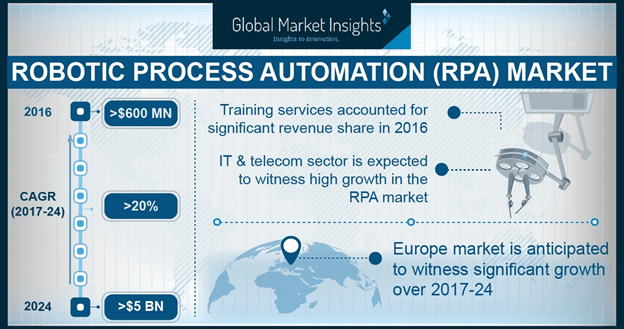Robotic process automation (RPA) market to witness widespread acclaim driven by increased deployment of automation across myriad end-use sectors
Publisher : Fractovia | Published Date : 2017-09-07Request Sample
Robotic process automation (RPA) market has been gaining remarkable popularity lately, subject to the fact that automation has become important component in various enterprises across the globe. It has been observed that many companies have been adopting RPA technology with an aim to reduce the capital cost of the products and modernize business operations. The rapidly increasing use of this technology in various sectors is a vital factor that is expected to stimulate robotic process automation industry share. More importantly, this technology is increasingly being deployed in the medical and oil & gas sectors, which are touted to be two of the most dynamic markets of today. Companies have lately been following practices such as centralized business plan, training, and periodic product developments, that depicts their apparent urgency to deploy consistent automation in their business methodologies. This change of tactics is likely to have a positive impetus on robotic process automation (RPA) market, which, as per reports, collected a revenue of USD 600 million in 2016.
U.S. RPA Market Share, By Organization Size, 2016

Reputed firms such as Xerox Corporation and IBM have implemented the RPA technology for a while now, to reduce costs and improve productivity. Apart from industrial applications, RPA is being favored by hospitals to quite an extent, to handle medication distribution, which will favorably propel RPA industry size. An instance proving the aforementioned statement to be true is that of the RAH implementing the largest automated pharmacy distribution system. The Royal Adelaide Hospital, based in South Australia, has recently implemented one of the largest automated pharmacy distribution systems, that boasts of the incorporation of RPA technology. Considering the benefits of this technology, many other hospitals across the Australian southern hemisphere have also been deploying this technology on large scale, which is likely to have a favorable impact on the regional robotic process automation market size.
The emergence of digital technologies such as artificial intelligence (AI), natural language processing (NLP), and machine learning have also apparently been adding significant value to robotic process automation industry. Recently, HCL Technologies, one of the big names in the software space, launched two AI powered services, namely, DRYiCE TAO and DRYiCE COPA to provide strategic consulting services and a process transformation platform to enterprises. Through the DRYiCE COPA, HCL has paved the way for delivering next-generation products to consumers by envisaging a difference in the conventional role of robotic process automation. Many such enterprises have been looking out for AI-based products to rebuild their systems, which is slated to boost robotic process automation (RPA) market share over the years ahead.
As per an RPA market report compiled by Global Market Insights, Inc., huge corporations have been incorporating RPA technology on a large scale to provide excellent management capabilities and optimize the business process. Software based robotic process automation is used for the various purposes such as information auditing and analyzing and business process monitoring. The surging demand for such products from a multitude of organizations to modernize business processes for handling customer queries is likely to fuel robotic process automation (RPA) market over the coming seven years.
Latin America: The new hotbed for RPA industry stakeholders
The industrial space in Latin America has of late been experiencing a dynamic transformation owing to the deployment of robotic process automation, subject to which several top-notch enterprises and service centers are expanding their business space across the region. Recently, Symphony ventures, a well-known company specializing in robotic process automation and intelligent automation, decided to expand its service centers across Latin America to fulfil the growing demand for its products in the region. If reports are to be believed, Symphony Ventures has witnessed a huge requirement for its automation services across Latin America, owing to the increasing utilization of the technology across Brazil, Argentina, Chile, Mexico, Columbia, Peru, and Guatemala, which will considerably stimulate LATAM robotic process automation (RPA) industry size over the coming seven years.
Another major factor that may generate lucrative opportunities for companies in robotic process automation market is that numerous clients from the telecom, banking, chemical, food processing, agriculture, and manufacturing sectors have been earnestly seeking RPA services. The deployment of RPA technology helps to improve operational functionality by enhancing the accuracy of work quality, and speed, which may spur RPA industry ahead. Speaking of companies, the competitive spectrum of RPA market includes biggies such as Automation Anywhere, Nice Systems Ltd., Blue Prism, Xerox Corporation, Ipsoft, Uipath, Celaton Ltd, Verint Systems, Pegasystems, and Redwood Software, that have been adopting growth strategies such as M&As to increase their customer base across the globe.
The wave of automation is likely to transform the service sector over the years ahead. Autonomous machines make work much easier as they have the capability to carry out remote operations that do not take friendly to human intervention - laying underwater cables, monitoring wear and tear of aircraft engines and drill tips, etc. In the future, it is expected that airports will be planning to undergo extensive refurbishment with the help of RPA technology. The growing automation implementation across airports for face scanning, check-in, robot baggage collection, apart from myriad other application arenas, is slated to influence robotic process automation (RPA) market share positively over the forthcoming years.